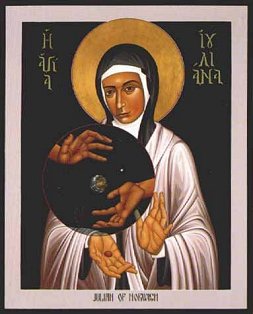
Robert Lenz
Today is the feast day of Julian of Norwich who was, somewhat confusingly, given the name, a woman. We don't know her actual name because she was renamed after the parish church to which her small dwelling was attached. She was a remarkable Christian of the 14th century, an anchorite or solitary. She lived with her cat and welcomed visitors for spiritual counsel and prayer.
Julian's Revelations of Divine Love may be the first book in the English language known to have been written by a woman. Julian was also known as a spiritual authority within her community, where she also served as a counsellor and advisor. She is held in high regard venerated in the Anglican and Lutheran churches and we're fond of her in our United Church as well. Perhaps she was a little too independent in her thinking to be canonized by the Roman Catholic church. She wrote, imaginatively that Jesus was our mother and our brother and saviour. She often wrote about God using maternal language.
For a long time I had the Robert Lenz icon of Julian holding a hazelnut as the cover of my appointment book. She wrote of a vision of the small and insignificant nut as a symbol of both the smallness and greatness of all things as they are encompassed by God's love.

Robert Lenz
He shewed me a little thing, the quantity of an hazel-nut, in the palm of my hand;
and it was as round as a ball.
I looked thereupon with eye of my understanding, and thought: What may this be?
And it was answered generally thus: It is all that is made.
I marvelled how it might last,
for methought it might suddenly have fallen to naught for little.
And I was answered in my understanding: It lasteth, and ever shall for that God loveth it.
And so All-thing hath the Being by the love of God.
Perhaps we can all honour Julian today by our prayerful awareness of God's divine presence in what we might otherwise pass by without consideration.
Show me O anchoress, your anchor-hold
Deep in the love of God, and hold me fast.
Show me again in whose hands we are held,
Speak to me from your window in the past,
Tell me again the tale of Love’s compassion
For all of us who fall onto the mire,
How he is wounded with us, how his passion
Quickens the love that haunted our desire.
Show me again the wonder of at-one-ment
Of Christ-in-us distinct and yet the same,
Who makes, and loves, and keeps us in each moment,
And looks on us with pity not with blame.
Keep telling me, for all my faith may waver,
Love is his meaning, only love, forever.
Malcolm Guite A Sonnet for Julian of Norwich

No comments:
Post a Comment